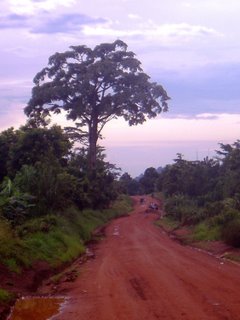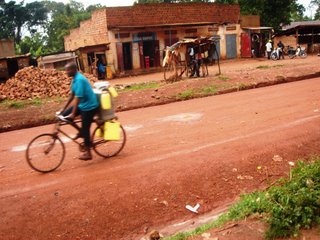Cracking Heads?
Passing under towering Mukavu trees, our driver eases gently along the dirt roads of Mukono district. In front of us, a flat-bed overloaded with firewood teeters dangerously on top of a mound of dirt. The mound is one in a regular series. This is a country in which SUV drivers have an excuse.
Before our arrival in Uganda, we had proposed a study to measure how often motorcyclists here used helmets. A law was recently passed requiring that drivers, but not passengers, wear them. No one here seems to know why. As motorcyclists in Kampala try to save the twenty dollars needed to buy proper headgear, one sees everything from construction hardhats to equestrian caps bobbing through the traffic flows.

Mukavu Tree
When we first arrived in Kampala, we learned that our study had become redundant. The Injury Control Centre of Uganda (ICCU), where we now work, was recently contracted by the World Health Organization (WHO) to perform the same study on a far grander scale. So, we adapted. We altered our plans to complement the larger study. We decided to leave Kampala, to learn the effect the new law is having outside city limits.
We are in search of a “rural” town, somewhere not too far from Kampala, so as to save on gas, but not too close, so as to create a reasonable contrast with the city. At the end of a bumpy lane, just down the road from a mud brick kiln, we find Loubugumou. It is a small collection of buildings and fruit stands, full of dust, playing children, and idle men. We place ourselves in front of the “See How God Loves” chapati shop, next door to the “Jesus Cares” barbershop, with a clear view of the road and the “Trust in God Soda Depot and Payphone” across the street.

Loubugumou
Over the next several hours and days we watch the road, ticking off riders and passenger as they glide past. The children entertain themselves with loud shouts of “Mzungu bye!” a semi-accurate mishmash of English and Luganda meant to convey, “Hello white person!” The women mind their fruit stands or pass by on errands. The men sit idly in front of their shops and motorcycles, awaiting a customer. Occasionally one will ride his bike morosely across the street to a fruit stand. Amna and I will debate if this qualifies him to be counted in the study.
At the end of the day the men gather in circles around benches to play board games. One of them offers to teach me to play. The board resembles Sorry! encased in a picture frame. Four men play for a pot worth slightly more than two dollars. It’s more than most earn for a day’s labour. It’s more than they or their families can afford to lose. I ask permission to take a photo. One man agrees on behalf of the group. Another, who speaks no English, is unwilling to be caught on film. He flees at the sight of my camera. I thank them in Luganda and the crowd laughs.

Board Game
At the end of a week, having observed nearly nine-hundred drivers and their passengers, there is neither a construction helmet, nor an equestrian cap in sight. A quick glance at our survey sheets shows that only about one in fifty were wearing any helmet at all. Those locals educated enough to speak English have been happy to explain the cause.
Motorcycle helmets aren’t designed for tropical climates. They’re hot, sticky, and uncomfortable. Motorcycles are often shared between several drivers. To save costs, they also share one helmet. Many are worried about head lice, communicable infections, and sores. For women, who spend a large portion of their limited income styling their hair, a helmet is guaranteed damage on their investment.
More importantly, no one seems clear on why helmets are necessary. It is thus unsurprising that as police presence dwindles outside the capital, so too does helmet usage. Some riders even take to carrying their helmets under one arm, popping them on their heads when they pass a police check and removing them again afterwards.
There has been no public education on the benefits of helmet usage and no precedent in local history to explain them. Some believe that the government passed the law requiring helmets because of pressure from donor countries. Others believe that it was done simply to imitate richer nations. Most are less concerned about the reasons than the inconvenience it causes. One man, who tells us his name is Mr. Ibrahim, explains that though he knows that in our country helmets have been linked to lower rates of injury, no study has ever been done to prove that this is true Uganda.
I flash back to a man I knew in Cambodia, working with the WHO and the Ministry of Health to promote helmet usage amongst motorcycle taxi drivers. “Months of ad campaigns, sit-down sessions, and public education, and when we ask them what their number one reason for wearing a helmet is, do you know what they say?! To keep dust out of their hair! Aargh!!”
I added the “Aargh!!” There were more expletives in the original version.
Seeing that helmets damage local hairstyles, the Ugandans don’t have even this slim motivation. Having visited nearby Kowolo hospital, notorious for treating the most road traffic accidents in the country, I can see their point. The hospital’s logbooks are full of fractured legs, arms, hands, and feet that occurred on the roads. Though many of their most urgent cases are not recorded properly, in the past five months not a single skull or neck fracture has been logged. Ignorant as I am of the statistics proving the benefits of helmet usage, I’m forced to wonder if maybe leg braces or wrist guards might not be a more appropriate measure.
In the meantime, with our data collected, we pull out from in front of the barber shop one last time, waving goodbye to smiling children and thanking the men for their hospitality. Some look up long enough to call out “Goodbye mzungu!” as we pass.
With only two short months in the country, there is little we can do to contribute to the larger question of how useful helmets are. At best our information will show how effective the new law is – the short answer is that outside of Kampala, it isn’t. For my part, I’d be curious to see someone answer Mr. Ibrahim’s challenge to prove that helmet usage prevents injuries in Uganda. In the meantime, without resources to enforce the law, or public education to explain it, to me it seems naïve to expect Ugandans to abide by it.

1 Comments:
Hi Adam,
Just reading about your experience and thought I would add (tongue-in-cheek, of course) that you'll probably find your head and neck injuries logged at the morgue, not the inpatient desk...
;-)
Ian
Post a Comment
<< Home